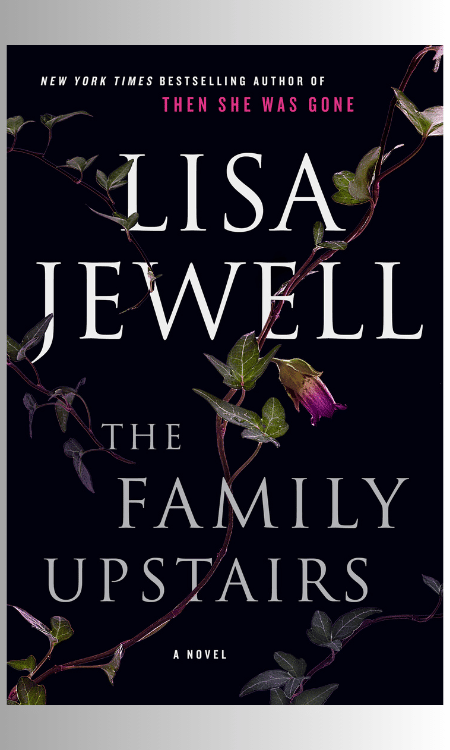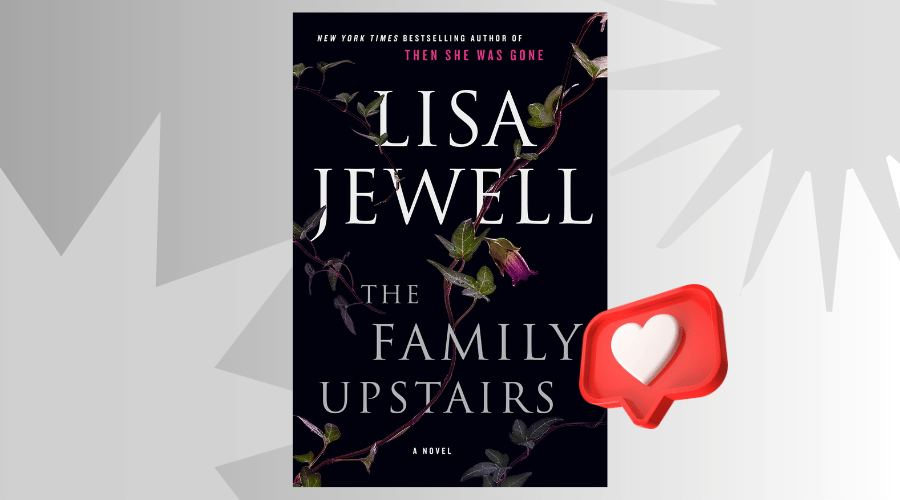The Family Upstairs by Lisa Jewell is a chilling psychological thriller about dark family secrets and mysterious pasts. When 25-year-old Libby inherits a lavish London mansion, she learns it was the site of a notorious tragedy: her parents and an unidentified man were found dead in the house, leaving behind a baby—Libby herself. And, as she tries to uncover the truth about her birth family, the story combines with two more perspectives to unravel sinister manipulation, obsession, and survival. At every turn of twists and turns, it’s a haunting tale of darkness within family, hiding secrets, and what lies ahead.

| Author | Lisa Jewell |
| Publication date | August 6, 2019 |
| Goodreads Rating | 3,96 |
| Page count | 340 pages |
| Genres | Thriller, Mystery, Fiction, Mystery Thriller, Suspense, Crime, Adult, Contemporary, Psychological Thriller |
The Family Upstairs Summary
The Family Upstairs by Lisa Jewell is a gripping psychological thriller that weaves together a chilling tale of family secrets, manipulation, and survival, told through three interconnected perspectives.
The Story Begins
The novel begins with 25-year-old Libby Jones, an ordinary woman living in London, discovering that she has inherited a grand mansion in the upscale neighborhood of Chelsea. Libby, adopted as a baby, knows little about her biological family, but the house comes with a disturbing history. Twenty-five years earlier, the police found her, then just 10 months old, in the mansion, well-cared-for but alone, while three adults—her parents and an unidentified man—were dead on the floor in an apparent suicide pact. The case was infamous, and the mystery of what happened in the house remained unsolved.
Multiple Narratives
The story alternates between three narrators: Libby in the present day, Lucy, a homeless single mother trying to survive in France, and Henry, whose recollections of his childhood in the mansion shed light on the sinister events that unfolded.
Henry’s Perspective
Henry’s narration takes readers back 25 years to when the Lamb family, a wealthy but troubled household, lived in the house. His father, a successful businessman, and his mother, an eccentric woman eager to help others, welcomed a bohemian couple, Birdie and Justin, into their home. What began as a gesture of charity quickly spiraled out of control. The strangers manipulated the family, took control of their finances, and imposed strict, cult-like rules. Henry recounts the psychological and physical abuse, the growing tension, and the bizarre dynamics that took over the once-happy home. The arrival of another family, including a boy named Phin, further complicated matters, particularly for young Henry, who developed an obsessive fixation on Phin.
Lucy’s Journey
Lucy’s perspective unfolds in the present as she struggles to care for her two children while escaping an abusive relationship. Desperate and on the brink of homelessness, Lucy receives a mysterious notification that “the baby is 25,” signaling that the time has come to reconnect with her past. Her journey to return to London is fraught with danger, but it’s clear her story is deeply tied to Libby’s inheritance and the secrets of the house.
Investigation of Libby
Libby was shocked by her inheritance and had to investigate further about her family history. Libby was joined by a journalist, Miller. He helped Libby understand about the dark house’s past, odd occupants, and how sinister events took place, killing people. Deepening her investigations, Libby found herself to be connected to Lucy and Henry, which gradually unfolds the truth regarding what really occurred in the mansion 25 years ago.
Stunning Climax
As the three narratives converge, the full picture comes into focus: the manipulative cult-like environment in the house, the harrowing events that led to the deaths of Libby’s parents, and the roles each character played in the tragedy. Twists abound, keeping readers guessing until the very end. Themes of survival, family loyalty, and the lingering impact of trauma are explored, culminating in a conclusion that is both haunting and satisfying.
The Family Upstairs: Ending
The ending of The Family Upstairs unveils the tragic truth behind the Lamb family’s past and connects Libby, Lucy, and Henry in ways they never imagined. Through Henry’s flashbacks, we learn how the Lamb family fell victim to manipulation and control when Birdie, Justin, and eventually the abusive David Thomsen moved into their home. The once-loving household became a prison, with David enforcing cult-like rules and draining the family’s resources. Desperate to escape, Henry, Lucy, and their friend Clemency hatched a plan that ended in tragedy. Henry poisoned David and the others, staging their deaths as a group suicide. Lucy fled with her children, while Henry stayed to care for baby Libby until social services intervened.
In the present, Libby discovers she is Serenity Lamb, the baby left behind in the house. She reunites with Lucy and her nieces and nephews, piecing together her family’s dark history, with the help of journalist Miller. Henry also reappears, obsessively searching for Phin—his childhood friend and unrequited love. However, it is revealed that Phin had escaped long ago and was living a nomadic life, trying to avoid his traumatic past. Henry cannot shake off this obsession, which brings into question his redemption and therefore his future.
The novel ends on a bittersweet note. Libby gets a sense of closure and begins building a new life with Lucy and her extended family, making something hopeful out of the darkness of their combined past. The events in the Lamb house have left their mark on everyone concerned, but ultimately, The Family Upstairs is a story of survival, resilience, and the strong, ongoing pull of family ties.
The Family Upstairs Characters
Here’s a list of the main characters in The Family Upstairs by Lisa Jewell, along with brief descriptions of their roles and personalities:
Libby Jones (Serenity Lamb)
The protagonist of the story, Libby is a 25-year-old woman who inherits a mysterious mansion in Chelsea. She was discovered as a baby in the house where her parents and an unidentified man were found dead. Curious and determined, Libby begins unraveling the secrets of her biological family and the house’s dark past.
Lucy Lamb
Libby’s biological sister, Lucy is a struggling single mother living in France when the story begins. After years of hardship, she is determined to return to London and reconnect with her past. Lucy is a resilient and resourceful character, deeply devoted to her children despite the trauma she’s endured.
Henry Lamb (Jr.)
The eldest child of the Lamb family, Henry narrates much of the story through his chilling recollections of life in the Chelsea mansion. Intelligent but emotionally scarred, Henry’s experiences have made him manipulative and obsessive, particularly about Phin Thomsen. His perspective provides key insights into the house’s dark history.
Phin Thomsen
The charismatic and enigmatic son of David Thomsen, Phin lived in the Lamb house during its darkest days. Henry’s unrequited love for Phin drives much of his narrative. Phin eventually escapes the house, choosing a nomadic life to distance himself from his traumatic past.
David Thomsen
A manipulative and abusive man, David becomes the self-proclaimed leader of the household after moving in with the Lamb family. His controlling behavior and cult-like influence over the family lead to the house’s downfall. David is a key antagonist in the story.
Birdie and Justin
A bohemian couple who initially move into the Lamb house as guests. While they bring excitement at first, their freeloading and manipulative tendencies enable David to take over the household, making them complicit in the chaos that unfolds.
Martina Lamb
The mother of Henry, Lucy, and Libby. Martina is portrayed as passive and unable to protect her family from the manipulative individuals who take over her home. Her inability to act contributes to the tragic events that occur.
Miller Roe
A journalist who helps Libby investigate her family’s past. Miller provides the support and resources Libby needs to piece together the mystery, though his initial interest is driven by the sensational nature of the story.
Clemency
A friend of the Lamb children who also lived in the house during its dark period. Clemency plays a significant role in helping the children escape, and her presence adds another layer to the story’s complexity.
These characters create a web of interconnected stories, each revealing more about the Lamb family’s tragic history and the sinister dynamics that unfolded in the Chelsea mansion. Their unique traits and motivations drive the suspense and moral ambiguity of the novel.
The Family Upstairs Review
The Family Upstairs is a gripping psychological thriller filled with dark family secrets, suspenseful twists, and complex characters. Lisa Jewell masterfully blends multiple narratives and timelines to create a chilling tale that keeps readers hooked until the very end. However, like any novel, it has its strengths and weaknesses. Here’s a detailed review of the book’s pros and cons:
Pros:
- Intriguing Plot: The story’s premise—a young woman inheriting a mansion with a dark past—is compelling and sets the stage for an eerie, suspenseful tale. The mystery of the Lamb family’s tragedy unfolds gradually, keeping readers engaged.
- Complex Characters: Each character is well-developed, with distinct personalities and motivations. The flawed, morally ambiguous nature of characters like Henry and Lucy adds depth and makes them feel realistic.
- Multiple Perspectives: The alternating narratives from Libby, Lucy, and Henry offer different layers to the story, allowing readers to piece together the puzzle from various angles. This structure enhances the suspense and keeps the pacing dynamic.
- Atmospheric Setting: The descriptions of the Chelsea mansion create an eerie and oppressive atmosphere that mirrors the tension within the story. The house feels like a character itself, adding to the chilling tone.
- Themes of Resilience and Survival: The novel explores heavy themes such as abuse, trauma, and manipulation, while also highlighting resilience and the human capacity to endure.
Cons:
- Unreliable Narrators: While Henry’s narration adds intrigue, his manipulative and obsessive tendencies make him an unreliable narrator. This can leave readers questioning the accuracy of his perspective, which may frustrate those looking for clearer answers.
- Slow Pacing in Some Parts: Certain sections, particularly in Libby’s narrative, feel slower compared to the intensity of Henry’s and Lucy’s stories. Some readers may find these moments less engaging.
- Predictability of Some Twists: While many twists are shocking, a few key revelations can feel predictable, especially for seasoned thriller readers.
- Underexplored Characters: Characters like Phin and Clemency are intriguing but feel underdeveloped compared to the main trio. Their stories leave lingering questions that aren’t fully resolved.
- Ambiguous Ending: The conclusion, while satisfying for some, leaves certain aspects open-ended, particularly regarding Henry’s future and Phin’s fate. This ambiguity might not appeal to readers who prefer neatly tied-up endings.
Final Verdict
The Family Upstairs is a dark, suspenseful, and thought-provoking thriller that explores the complexities of family dynamics and the aftermath of trauma. While it excels in character development and atmosphere, its slower moments and open-ended conclusion might not suit everyone’s taste. For fans of psychological thrillers with layered storytelling and morally complex characters, this novel is a must-read.

